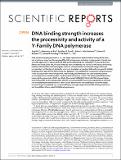DNA binding strength increases the processivity and activity of a Y-Family DNA polymerase
Author(s)
Wu, Jing; de Paz, Alexandra; Zamft, Bradley M.; Marblestone, Adam H.; Kording, Konrad P.; Tyo, Keith E. J.; Boyden, Edward; ... Show more Show less
Downloads41598-017-02578-3.pdf (1.653Mb)
PUBLISHER_POLICY
Publisher Policy
Article is made available in accordance with the publisher's policy and may be subject to US copyright law. Please refer to the publisher's site for terms of use.
Terms of use
Metadata
Show full item recordAbstract
DNA polymerase (pol) processivity, i.e., the bases a polymerase extends before falling off the DNA, and activity are important for copying difficult DNA sequences, including simple repeats. Y-family pols would be appealing for copying difficult DNA and incorporating non-natural dNTPs, due to their low fidelity and loose active site, but are limited by poor processivity and activity. In this study, the binding between Dbh and DNA was investigated to better understand how to rationally design enhanced processivity in a Y-family pol. Guided by structural simulation, a fused pol Sdbh with non-specific dsDNA binding protein Sso7d in the N-terminus was designed. This modification increased in vitro processivity 4-fold as compared to the wild-type Dbh. Additionally, bioinformatics was used to identify amino acid mutations that would increase stabilization of Dbh bound to DNA. The variant SdbhM76I further improved the processivity of Dbh by 10 fold. The variant SdbhKSKIP241-245RVRKS showed higher activity than Dbh on the incorporation of dCTP (correct) and dATP (incorrect) opposite the G (normal) or 8-oxoG(damaged) template base. These results demonstrate the capability to rationally design increases in pol processivity and catalytic efficiency through computational DNA binding predictions and the addition of non-specific DNA binding domains.
Date issued
2017-07Department
Massachusetts Institute of Technology. Department of Biological Engineering; Massachusetts Institute of Technology. Media Laboratory; McGovern Institute for Brain Research at MITJournal
Scientific Reports
Publisher
Nature Publishing Group
Citation
Wu, Jing et al. “DNA Binding Strength Increases the Processivity and Activity of a Y-Family DNA Polymerase.” Scientific Reports 7, 1 (July 2017): 4756 © The Author(s) 2017
Version: Final published version
ISSN
2045-2322